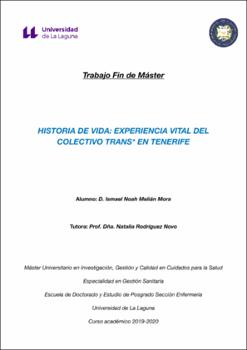Historia de vida: experiencia vital del colectivo trans* en Tenerife
Autor
Melián Mora, Ismael NoahFecha
2021Resumen
Desde tiempo inmemorables, el género y el sentir humano ha sido sujeto de debate.
Desde el inicio de la historia escrita, se recogen múltiples expresiones de género
diversas, las cuales se manifiestan hasta hoy en día. Víctimas de la discriminación, el
ostracismo social y el maltrato, el colectivo trans* ha experimentado un avance político,
social y sanitario en las últimas décadas, realizando múltiples cambios que apuestan por
su supervivencia y reconocimiento social. Lejos de la mera recolección de datos, este
proyecto busca dar voz a los silenciados durante siglos, situando el sujeto de estudio en
primera línea y dándole voz para contar su propia historia, con el fin de comprender su
trayectoria vital, pudiendo establecer a partir de ello redes de apoyo y acciones que
mejoren la experiencia de las generaciones futuras.
En España, se estima que existe una prevalencia transexual de 1/1000 habitantes,
registradas en las diferentes Unidades de Género repartidas por el país. En Canarias, se
instauró en 2009 la Unidad de Atención a la Transexualidad (UAT), cuyas solicitudes
ascendieron, en la última recogida de datos (2011), a un total de 350 pacientes; lo que se
traduce en una prevalencia de 2.6 casos por cada 1000 personas, no existiendo datos
posteriores concluyentes. Aunque la creación de protocolos ha mejorado la atención de
estas personas, existen estudios que indican que la atención sanitaria proporcionada no
cumple las necesidades o expectativas de las mismas. Por ello, este proyecto establece
como objetivo principal conocer sus vivencias, inquietudes y sufrimientos, usando la
metodología cualitativa “historia de vida”, la cual permite entender el proceso vital del
sujeto, mostrando las claves necesarias para la mejora de la experiencia en la atención y
abordaje del colectivo trans*. Since time immemorial, gender and human sentiment have been the subject of debate.
Since the beginning of written history, multiple diverse gender expressions are collected,
which are manifested until today. Victims of discrimination, social ostracism and
mistreatment, the trans * collective has experienced political, social and health progress
in recent decades, making multiple changes that are committed to their survival and
social recognition. Far from the mere collection of data, this project seeks to give a voice
to those who have been silenced for centuries, placing the subject of study in the
forefront and giving them a voice to tell their own story, in order to understand their life
trajectory, being able to establish from this is support networks and actions that improve
the experience of future generations.
In Spain, it’ s estimated that there is a transsexual prevalence of 1/1000 habitants,
registered in the different Gender Units throughout the country. In the Canary Islands, the
Transsexual Care Unit (UAT) was established in 2009, whose applications amounted, in
the last data collection (2011), to a total of 350 patients; which translates into a
prevalence of 2.6 cases per 1000 people, with no subsequent conclusive data. Although
the creation of protocols has improved the care of these people, there are studies that
indicate that the health care provided does not meet their needs or expectations. For this
reason, this project establishes as its main objective to know their experiences, concerns
and sufferings, using the qualitative methodology "life history", which allows to
understand the life process of the subject, showing the keys necessary to improve the
experience in care and addressing the trans * collective.




